Guided Reflection Essay: Indigenous Health and Wellbeing, 92441/92456
VerifiedAdded on 2022/10/19
|9
|2146
|451
Essay
AI Summary
This essay presents a guided reflection on the author's evolving understanding of Indigenous health and wellbeing, specifically focusing on Aboriginal and Torres Strait Islander communities. The student utilizes Gibbs' reflective model to analyze personal beliefs, attitudes, and experiences before and after engaging with the course material. The essay delves into initial misconceptions, stereotypes, and the impact of colonization on Indigenous populations, highlighting the importance of cultural awareness and sensitivity in healthcare practices. Specific learning activities are referenced to demonstrate how the student's perspectives have shifted, emphasizing the need for improved healthcare services that incorporate cultural considerations. The reflection concludes with a discussion of future actions the student intends to take as a nurse to improve the health outcomes of Indigenous communities, advocating for cultural respect, patient education, and the involvement of Indigenous nurses in healthcare delivery.
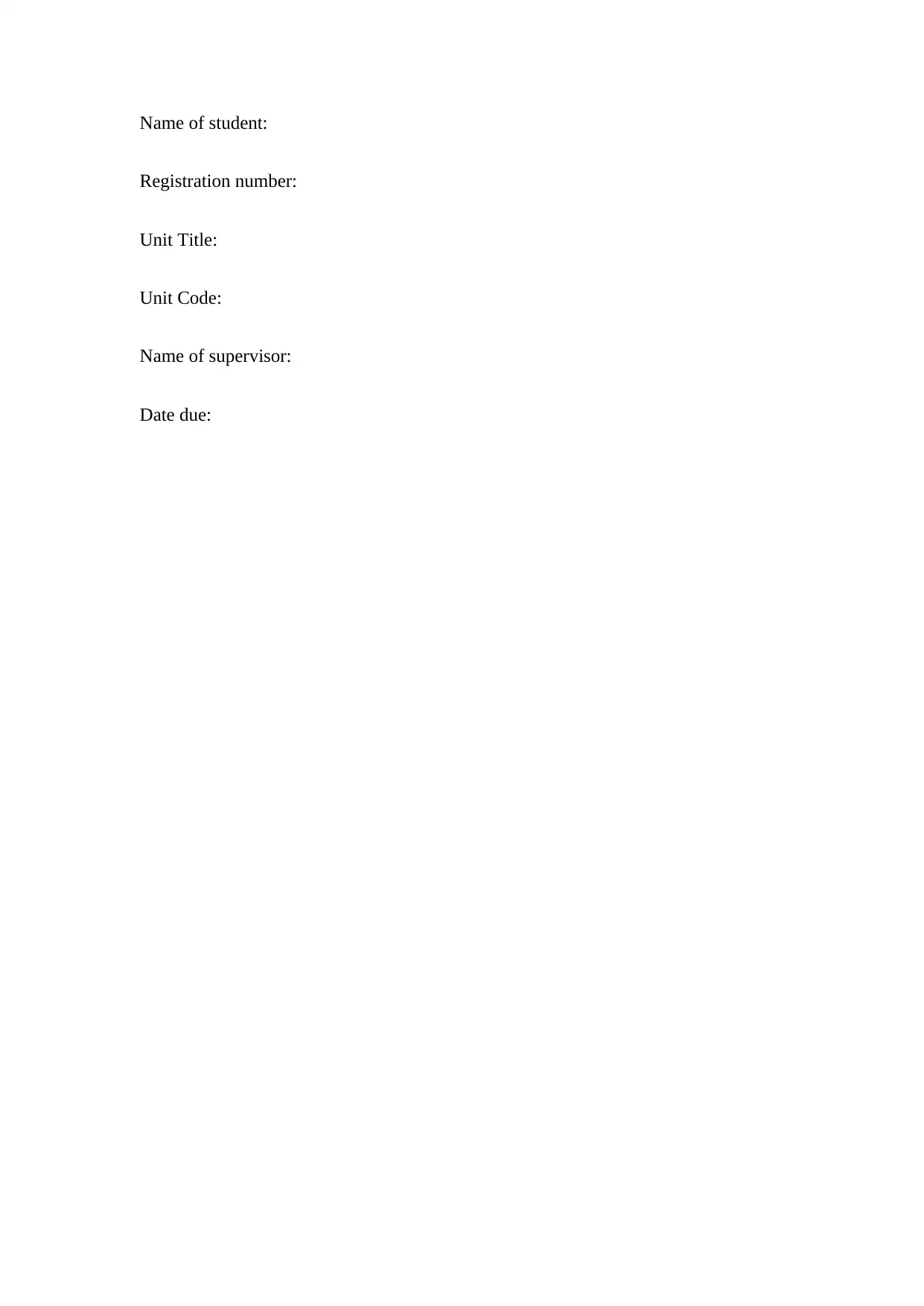
Name of student:
Registration number:
Unit Title:
Unit Code:
Name of supervisor:
Date due:
Registration number:
Unit Title:
Unit Code:
Name of supervisor:
Date due:
Paraphrase This Document
Need a fresh take? Get an instant paraphrase of this document with our AI Paraphraser
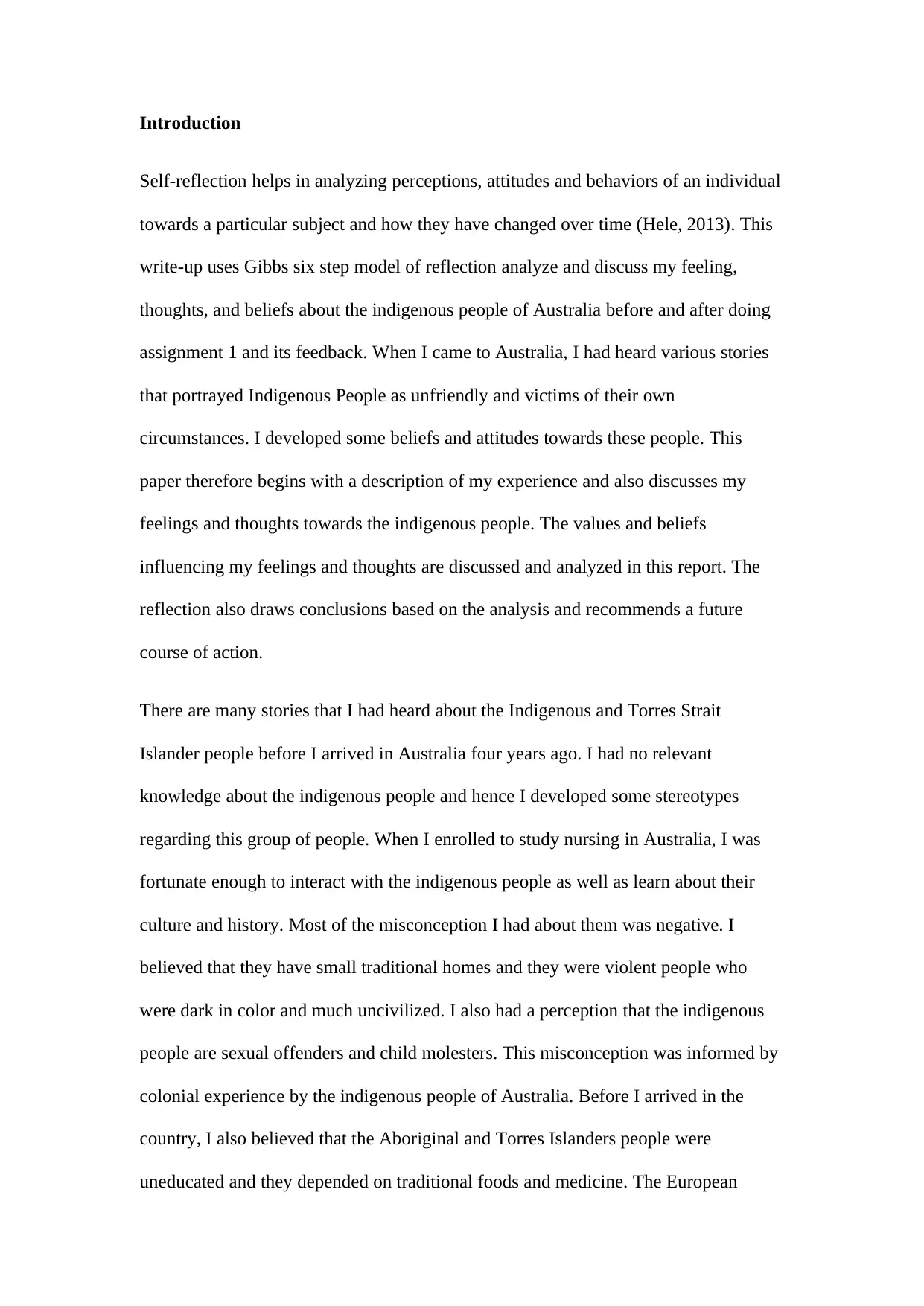
Introduction
Self-reflection helps in analyzing perceptions, attitudes and behaviors of an individual
towards a particular subject and how they have changed over time (Hele, 2013). This
write-up uses Gibbs six step model of reflection analyze and discuss my feeling,
thoughts, and beliefs about the indigenous people of Australia before and after doing
assignment 1 and its feedback. When I came to Australia, I had heard various stories
that portrayed Indigenous People as unfriendly and victims of their own
circumstances. I developed some beliefs and attitudes towards these people. This
paper therefore begins with a description of my experience and also discusses my
feelings and thoughts towards the indigenous people. The values and beliefs
influencing my feelings and thoughts are discussed and analyzed in this report. The
reflection also draws conclusions based on the analysis and recommends a future
course of action.
There are many stories that I had heard about the Indigenous and Torres Strait
Islander people before I arrived in Australia four years ago. I had no relevant
knowledge about the indigenous people and hence I developed some stereotypes
regarding this group of people. When I enrolled to study nursing in Australia, I was
fortunate enough to interact with the indigenous people as well as learn about their
culture and history. Most of the misconception I had about them was negative. I
believed that they have small traditional homes and they were violent people who
were dark in color and much uncivilized. I also had a perception that the indigenous
people are sexual offenders and child molesters. This misconception was informed by
colonial experience by the indigenous people of Australia. Before I arrived in the
country, I also believed that the Aboriginal and Torres Islanders people were
uneducated and they depended on traditional foods and medicine. The European
Self-reflection helps in analyzing perceptions, attitudes and behaviors of an individual
towards a particular subject and how they have changed over time (Hele, 2013). This
write-up uses Gibbs six step model of reflection analyze and discuss my feeling,
thoughts, and beliefs about the indigenous people of Australia before and after doing
assignment 1 and its feedback. When I came to Australia, I had heard various stories
that portrayed Indigenous People as unfriendly and victims of their own
circumstances. I developed some beliefs and attitudes towards these people. This
paper therefore begins with a description of my experience and also discusses my
feelings and thoughts towards the indigenous people. The values and beliefs
influencing my feelings and thoughts are discussed and analyzed in this report. The
reflection also draws conclusions based on the analysis and recommends a future
course of action.
There are many stories that I had heard about the Indigenous and Torres Strait
Islander people before I arrived in Australia four years ago. I had no relevant
knowledge about the indigenous people and hence I developed some stereotypes
regarding this group of people. When I enrolled to study nursing in Australia, I was
fortunate enough to interact with the indigenous people as well as learn about their
culture and history. Most of the misconception I had about them was negative. I
believed that they have small traditional homes and they were violent people who
were dark in color and much uncivilized. I also had a perception that the indigenous
people are sexual offenders and child molesters. This misconception was informed by
colonial experience by the indigenous people of Australia. Before I arrived in the
country, I also believed that the Aboriginal and Torres Islanders people were
uneducated and they depended on traditional foods and medicine. The European
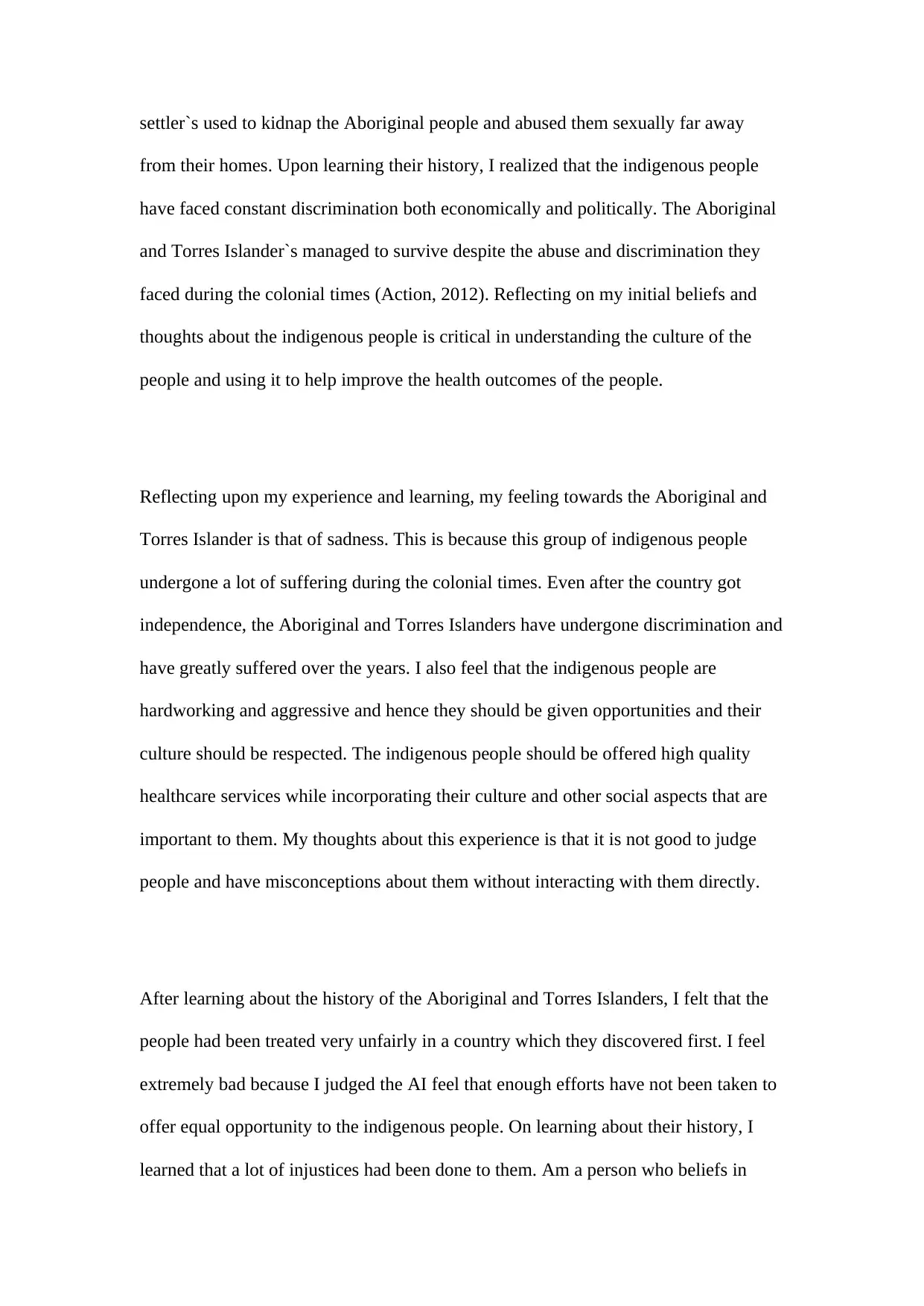
settler`s used to kidnap the Aboriginal people and abused them sexually far away
from their homes. Upon learning their history, I realized that the indigenous people
have faced constant discrimination both economically and politically. The Aboriginal
and Torres Islander`s managed to survive despite the abuse and discrimination they
faced during the colonial times (Action, 2012). Reflecting on my initial beliefs and
thoughts about the indigenous people is critical in understanding the culture of the
people and using it to help improve the health outcomes of the people.
Reflecting upon my experience and learning, my feeling towards the Aboriginal and
Torres Islander is that of sadness. This is because this group of indigenous people
undergone a lot of suffering during the colonial times. Even after the country got
independence, the Aboriginal and Torres Islanders have undergone discrimination and
have greatly suffered over the years. I also feel that the indigenous people are
hardworking and aggressive and hence they should be given opportunities and their
culture should be respected. The indigenous people should be offered high quality
healthcare services while incorporating their culture and other social aspects that are
important to them. My thoughts about this experience is that it is not good to judge
people and have misconceptions about them without interacting with them directly.
After learning about the history of the Aboriginal and Torres Islanders, I felt that the
people had been treated very unfairly in a country which they discovered first. I feel
extremely bad because I judged the AI feel that enough efforts have not been taken to
offer equal opportunity to the indigenous people. On learning about their history, I
learned that a lot of injustices had been done to them. Am a person who beliefs in
from their homes. Upon learning their history, I realized that the indigenous people
have faced constant discrimination both economically and politically. The Aboriginal
and Torres Islander`s managed to survive despite the abuse and discrimination they
faced during the colonial times (Action, 2012). Reflecting on my initial beliefs and
thoughts about the indigenous people is critical in understanding the culture of the
people and using it to help improve the health outcomes of the people.
Reflecting upon my experience and learning, my feeling towards the Aboriginal and
Torres Islander is that of sadness. This is because this group of indigenous people
undergone a lot of suffering during the colonial times. Even after the country got
independence, the Aboriginal and Torres Islanders have undergone discrimination and
have greatly suffered over the years. I also feel that the indigenous people are
hardworking and aggressive and hence they should be given opportunities and their
culture should be respected. The indigenous people should be offered high quality
healthcare services while incorporating their culture and other social aspects that are
important to them. My thoughts about this experience is that it is not good to judge
people and have misconceptions about them without interacting with them directly.
After learning about the history of the Aboriginal and Torres Islanders, I felt that the
people had been treated very unfairly in a country which they discovered first. I feel
extremely bad because I judged the AI feel that enough efforts have not been taken to
offer equal opportunity to the indigenous people. On learning about their history, I
learned that a lot of injustices had been done to them. Am a person who beliefs in
⊘ This is a preview!⊘
Do you want full access?
Subscribe today to unlock all pages.

Trusted by 1+ million students worldwide
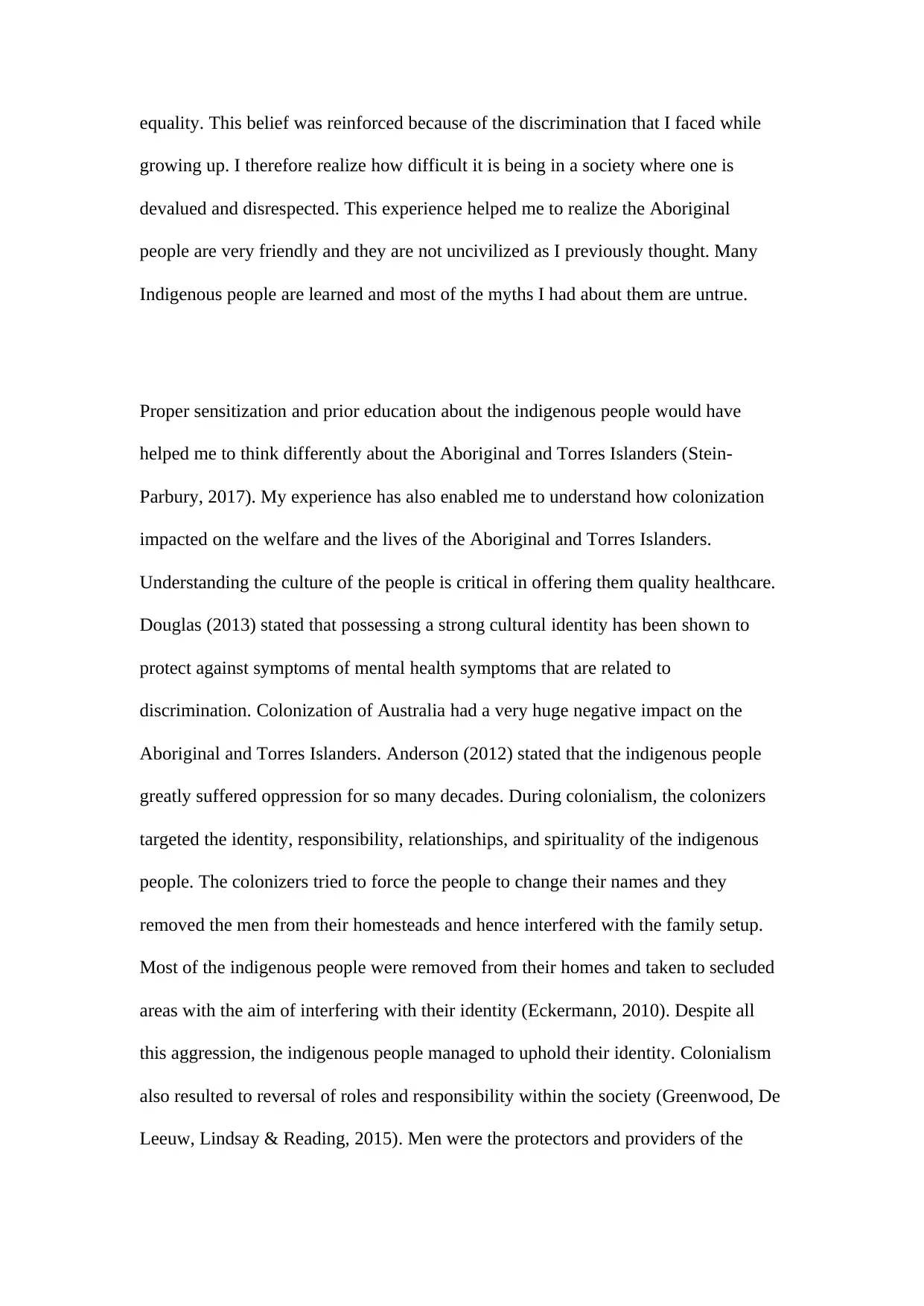
equality. This belief was reinforced because of the discrimination that I faced while
growing up. I therefore realize how difficult it is being in a society where one is
devalued and disrespected. This experience helped me to realize the Aboriginal
people are very friendly and they are not uncivilized as I previously thought. Many
Indigenous people are learned and most of the myths I had about them are untrue.
Proper sensitization and prior education about the indigenous people would have
helped me to think differently about the Aboriginal and Torres Islanders (Stein-
Parbury, 2017). My experience has also enabled me to understand how colonization
impacted on the welfare and the lives of the Aboriginal and Torres Islanders.
Understanding the culture of the people is critical in offering them quality healthcare.
Douglas (2013) stated that possessing a strong cultural identity has been shown to
protect against symptoms of mental health symptoms that are related to
discrimination. Colonization of Australia had a very huge negative impact on the
Aboriginal and Torres Islanders. Anderson (2012) stated that the indigenous people
greatly suffered oppression for so many decades. During colonialism, the colonizers
targeted the identity, responsibility, relationships, and spirituality of the indigenous
people. The colonizers tried to force the people to change their names and they
removed the men from their homesteads and hence interfered with the family setup.
Most of the indigenous people were removed from their homes and taken to secluded
areas with the aim of interfering with their identity (Eckermann, 2010). Despite all
this aggression, the indigenous people managed to uphold their identity. Colonialism
also resulted to reversal of roles and responsibility within the society (Greenwood, De
Leeuw, Lindsay & Reading, 2015). Men were the protectors and providers of the
growing up. I therefore realize how difficult it is being in a society where one is
devalued and disrespected. This experience helped me to realize the Aboriginal
people are very friendly and they are not uncivilized as I previously thought. Many
Indigenous people are learned and most of the myths I had about them are untrue.
Proper sensitization and prior education about the indigenous people would have
helped me to think differently about the Aboriginal and Torres Islanders (Stein-
Parbury, 2017). My experience has also enabled me to understand how colonization
impacted on the welfare and the lives of the Aboriginal and Torres Islanders.
Understanding the culture of the people is critical in offering them quality healthcare.
Douglas (2013) stated that possessing a strong cultural identity has been shown to
protect against symptoms of mental health symptoms that are related to
discrimination. Colonization of Australia had a very huge negative impact on the
Aboriginal and Torres Islanders. Anderson (2012) stated that the indigenous people
greatly suffered oppression for so many decades. During colonialism, the colonizers
targeted the identity, responsibility, relationships, and spirituality of the indigenous
people. The colonizers tried to force the people to change their names and they
removed the men from their homesteads and hence interfered with the family setup.
Most of the indigenous people were removed from their homes and taken to secluded
areas with the aim of interfering with their identity (Eckermann, 2010). Despite all
this aggression, the indigenous people managed to uphold their identity. Colonialism
also resulted to reversal of roles and responsibility within the society (Greenwood, De
Leeuw, Lindsay & Reading, 2015). Men were the protectors and providers of the
Paraphrase This Document
Need a fresh take? Get an instant paraphrase of this document with our AI Paraphraser
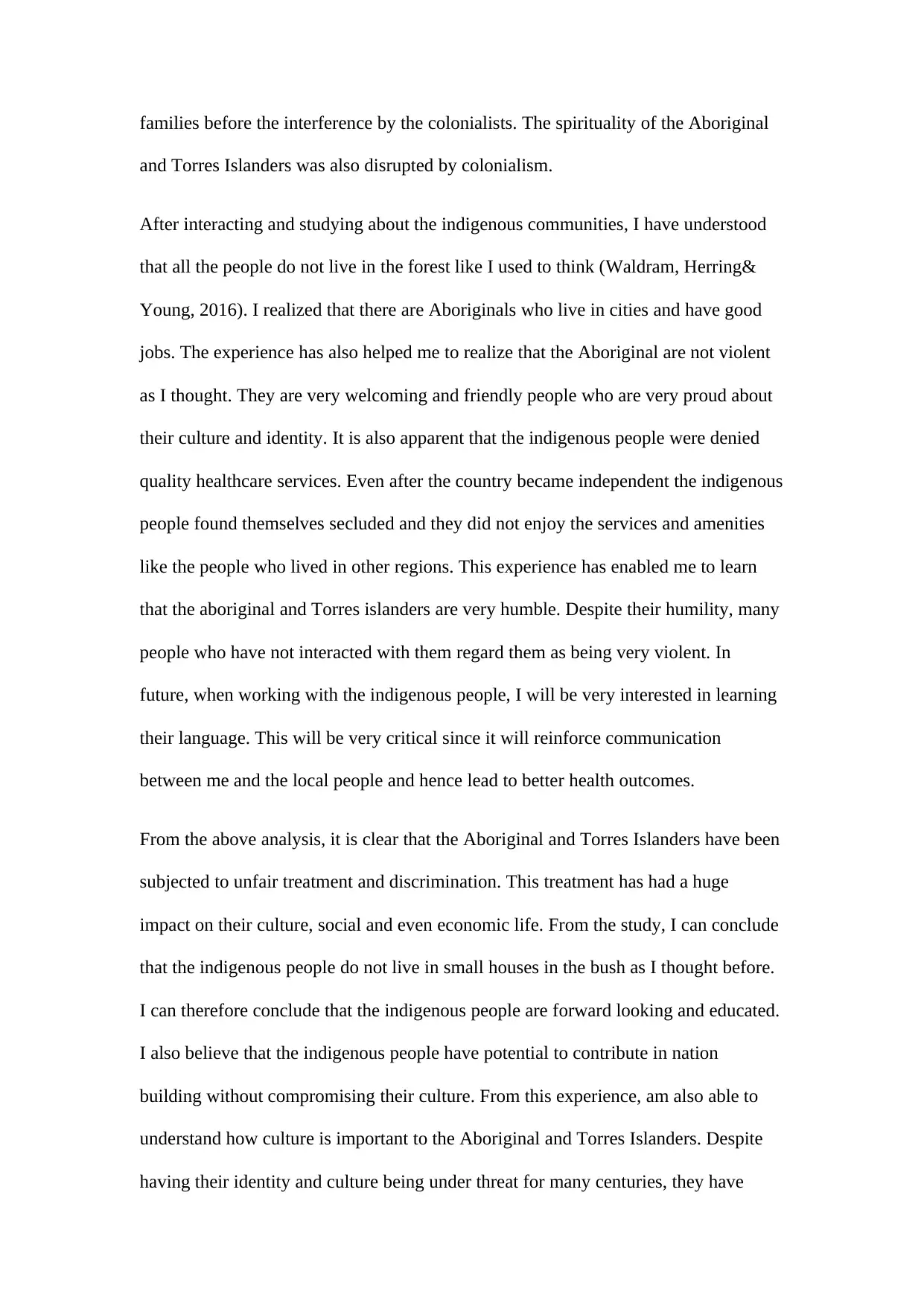
families before the interference by the colonialists. The spirituality of the Aboriginal
and Torres Islanders was also disrupted by colonialism.
After interacting and studying about the indigenous communities, I have understood
that all the people do not live in the forest like I used to think (Waldram, Herring&
Young, 2016). I realized that there are Aboriginals who live in cities and have good
jobs. The experience has also helped me to realize that the Aboriginal are not violent
as I thought. They are very welcoming and friendly people who are very proud about
their culture and identity. It is also apparent that the indigenous people were denied
quality healthcare services. Even after the country became independent the indigenous
people found themselves secluded and they did not enjoy the services and amenities
like the people who lived in other regions. This experience has enabled me to learn
that the aboriginal and Torres islanders are very humble. Despite their humility, many
people who have not interacted with them regard them as being very violent. In
future, when working with the indigenous people, I will be very interested in learning
their language. This will be very critical since it will reinforce communication
between me and the local people and hence lead to better health outcomes.
From the above analysis, it is clear that the Aboriginal and Torres Islanders have been
subjected to unfair treatment and discrimination. This treatment has had a huge
impact on their culture, social and even economic life. From the study, I can conclude
that the indigenous people do not live in small houses in the bush as I thought before.
I can therefore conclude that the indigenous people are forward looking and educated.
I also believe that the indigenous people have potential to contribute in nation
building without compromising their culture. From this experience, am also able to
understand how culture is important to the Aboriginal and Torres Islanders. Despite
having their identity and culture being under threat for many centuries, they have
and Torres Islanders was also disrupted by colonialism.
After interacting and studying about the indigenous communities, I have understood
that all the people do not live in the forest like I used to think (Waldram, Herring&
Young, 2016). I realized that there are Aboriginals who live in cities and have good
jobs. The experience has also helped me to realize that the Aboriginal are not violent
as I thought. They are very welcoming and friendly people who are very proud about
their culture and identity. It is also apparent that the indigenous people were denied
quality healthcare services. Even after the country became independent the indigenous
people found themselves secluded and they did not enjoy the services and amenities
like the people who lived in other regions. This experience has enabled me to learn
that the aboriginal and Torres islanders are very humble. Despite their humility, many
people who have not interacted with them regard them as being very violent. In
future, when working with the indigenous people, I will be very interested in learning
their language. This will be very critical since it will reinforce communication
between me and the local people and hence lead to better health outcomes.
From the above analysis, it is clear that the Aboriginal and Torres Islanders have been
subjected to unfair treatment and discrimination. This treatment has had a huge
impact on their culture, social and even economic life. From the study, I can conclude
that the indigenous people do not live in small houses in the bush as I thought before.
I can therefore conclude that the indigenous people are forward looking and educated.
I also believe that the indigenous people have potential to contribute in nation
building without compromising their culture. From this experience, am also able to
understand how culture is important to the Aboriginal and Torres Islanders. Despite
having their identity and culture being under threat for many centuries, they have
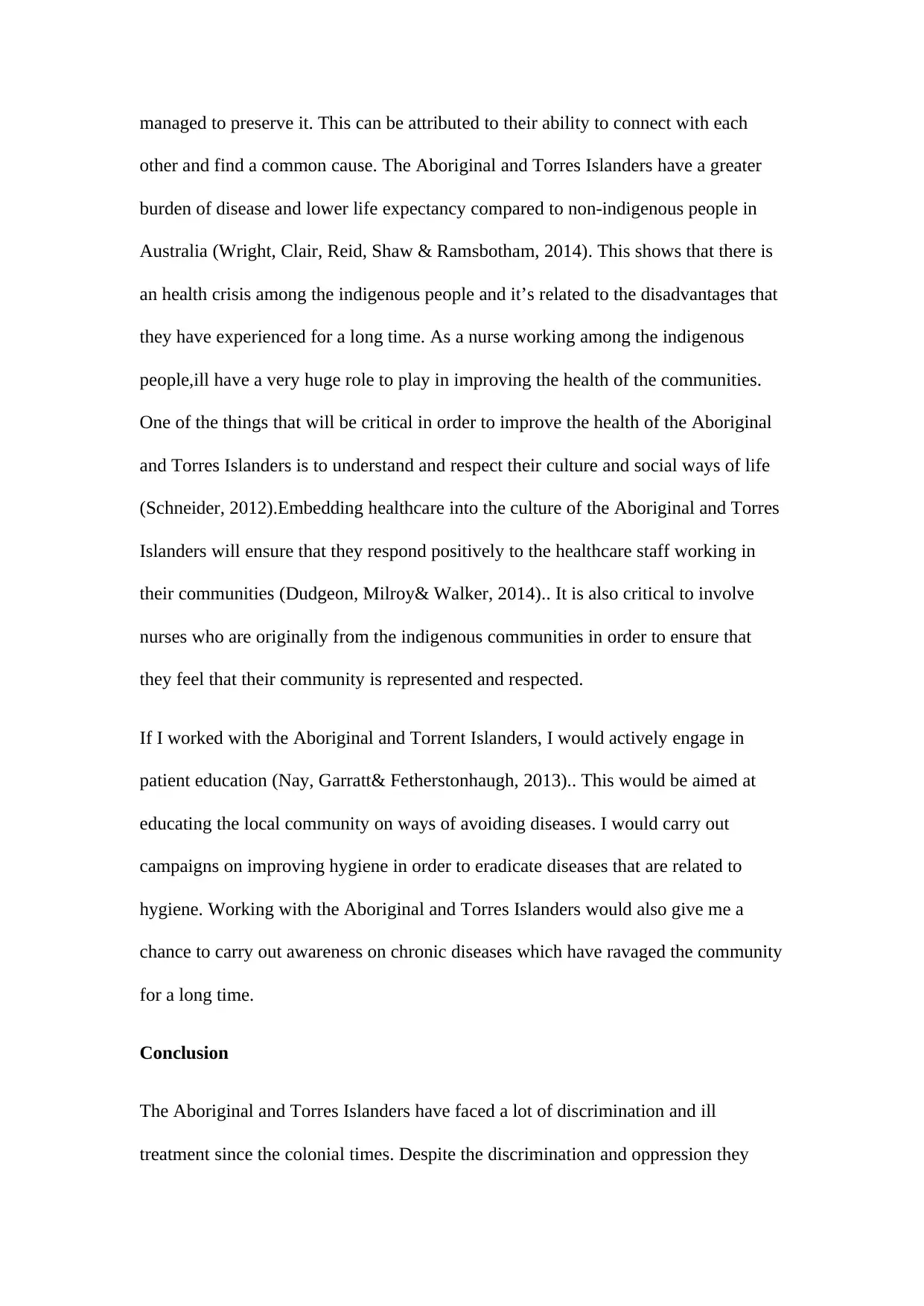
managed to preserve it. This can be attributed to their ability to connect with each
other and find a common cause. The Aboriginal and Torres Islanders have a greater
burden of disease and lower life expectancy compared to non-indigenous people in
Australia (Wright, Clair, Reid, Shaw & Ramsbotham, 2014). This shows that there is
an health crisis among the indigenous people and it’s related to the disadvantages that
they have experienced for a long time. As a nurse working among the indigenous
people,ill have a very huge role to play in improving the health of the communities.
One of the things that will be critical in order to improve the health of the Aboriginal
and Torres Islanders is to understand and respect their culture and social ways of life
(Schneider, 2012).Embedding healthcare into the culture of the Aboriginal and Torres
Islanders will ensure that they respond positively to the healthcare staff working in
their communities (Dudgeon, Milroy& Walker, 2014).. It is also critical to involve
nurses who are originally from the indigenous communities in order to ensure that
they feel that their community is represented and respected.
If I worked with the Aboriginal and Torrent Islanders, I would actively engage in
patient education (Nay, Garratt& Fetherstonhaugh, 2013).. This would be aimed at
educating the local community on ways of avoiding diseases. I would carry out
campaigns on improving hygiene in order to eradicate diseases that are related to
hygiene. Working with the Aboriginal and Torres Islanders would also give me a
chance to carry out awareness on chronic diseases which have ravaged the community
for a long time.
Conclusion
The Aboriginal and Torres Islanders have faced a lot of discrimination and ill
treatment since the colonial times. Despite the discrimination and oppression they
other and find a common cause. The Aboriginal and Torres Islanders have a greater
burden of disease and lower life expectancy compared to non-indigenous people in
Australia (Wright, Clair, Reid, Shaw & Ramsbotham, 2014). This shows that there is
an health crisis among the indigenous people and it’s related to the disadvantages that
they have experienced for a long time. As a nurse working among the indigenous
people,ill have a very huge role to play in improving the health of the communities.
One of the things that will be critical in order to improve the health of the Aboriginal
and Torres Islanders is to understand and respect their culture and social ways of life
(Schneider, 2012).Embedding healthcare into the culture of the Aboriginal and Torres
Islanders will ensure that they respond positively to the healthcare staff working in
their communities (Dudgeon, Milroy& Walker, 2014).. It is also critical to involve
nurses who are originally from the indigenous communities in order to ensure that
they feel that their community is represented and respected.
If I worked with the Aboriginal and Torrent Islanders, I would actively engage in
patient education (Nay, Garratt& Fetherstonhaugh, 2013).. This would be aimed at
educating the local community on ways of avoiding diseases. I would carry out
campaigns on improving hygiene in order to eradicate diseases that are related to
hygiene. Working with the Aboriginal and Torres Islanders would also give me a
chance to carry out awareness on chronic diseases which have ravaged the community
for a long time.
Conclusion
The Aboriginal and Torres Islanders have faced a lot of discrimination and ill
treatment since the colonial times. Despite the discrimination and oppression they
⊘ This is a preview!⊘
Do you want full access?
Subscribe today to unlock all pages.

Trusted by 1+ million students worldwide
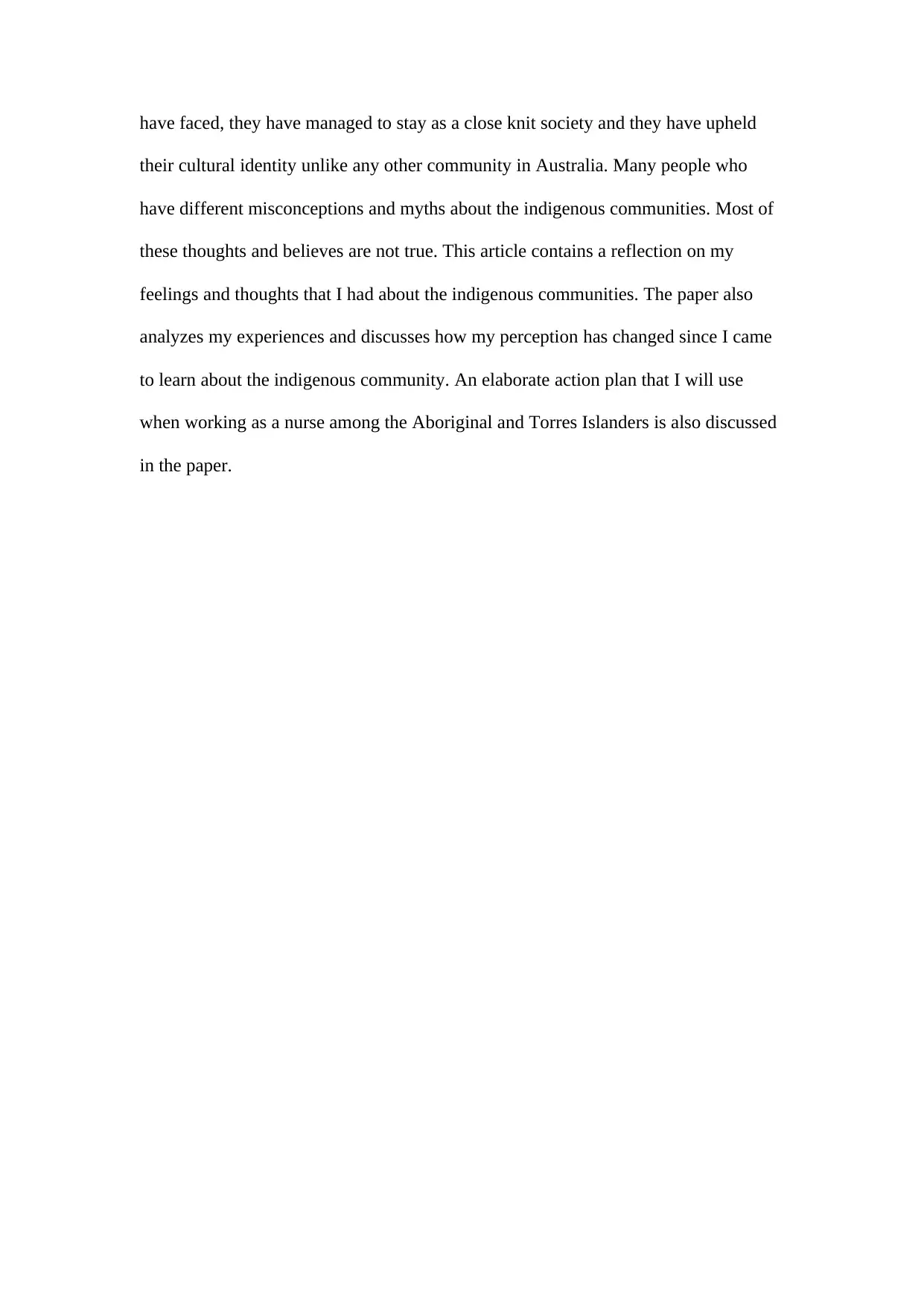
have faced, they have managed to stay as a close knit society and they have upheld
their cultural identity unlike any other community in Australia. Many people who
have different misconceptions and myths about the indigenous communities. Most of
these thoughts and believes are not true. This article contains a reflection on my
feelings and thoughts that I had about the indigenous communities. The paper also
analyzes my experiences and discusses how my perception has changed since I came
to learn about the indigenous community. An elaborate action plan that I will use
when working as a nurse among the Aboriginal and Torres Islanders is also discussed
in the paper.
their cultural identity unlike any other community in Australia. Many people who
have different misconceptions and myths about the indigenous communities. Most of
these thoughts and believes are not true. This article contains a reflection on my
feelings and thoughts that I had about the indigenous communities. The paper also
analyzes my experiences and discusses how my perception has changed since I came
to learn about the indigenous community. An elaborate action plan that I will use
when working as a nurse among the Aboriginal and Torres Islanders is also discussed
in the paper.
Paraphrase This Document
Need a fresh take? Get an instant paraphrase of this document with our AI Paraphraser
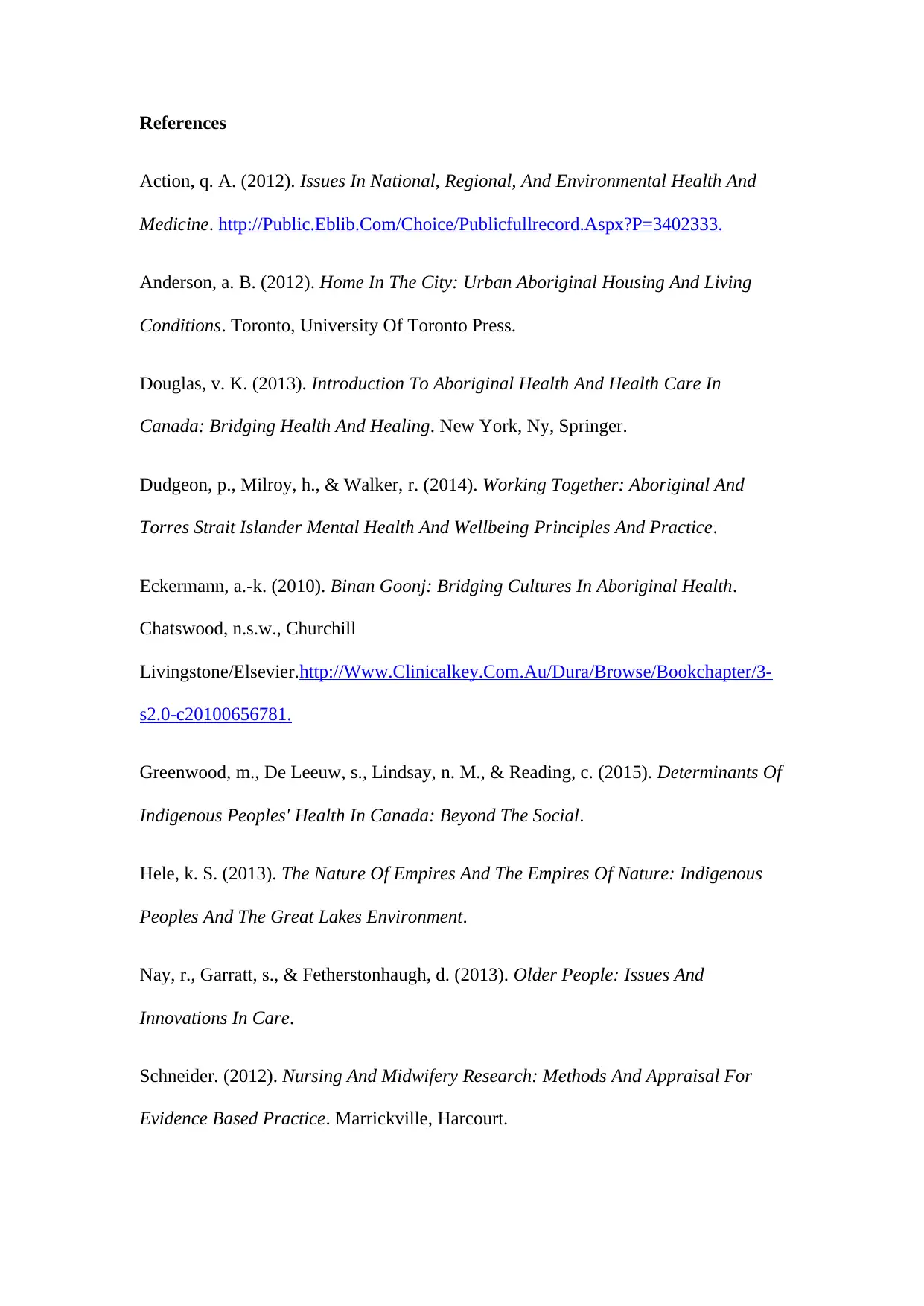
References
Action, q. A. (2012). Issues In National, Regional, And Environmental Health And
Medicine. http://Public.Eblib.Com/Choice/Publicfullrecord.Aspx?P=3402333.
Anderson, a. B. (2012). Home In The City: Urban Aboriginal Housing And Living
Conditions. Toronto, University Of Toronto Press.
Douglas, v. K. (2013). Introduction To Aboriginal Health And Health Care In
Canada: Bridging Health And Healing. New York, Ny, Springer.
Dudgeon, p., Milroy, h., & Walker, r. (2014). Working Together: Aboriginal And
Torres Strait Islander Mental Health And Wellbeing Principles And Practice.
Eckermann, a.-k. (2010). Binan Goonj: Bridging Cultures In Aboriginal Health.
Chatswood, n.s.w., Churchill
Livingstone/Elsevier.http://Www.Clinicalkey.Com.Au/Dura/Browse/Bookchapter/3-
s2.0-c20100656781.
Greenwood, m., De Leeuw, s., Lindsay, n. M., & Reading, c. (2015). Determinants Of
Indigenous Peoples' Health In Canada: Beyond The Social.
Hele, k. S. (2013). The Nature Of Empires And The Empires Of Nature: Indigenous
Peoples And The Great Lakes Environment.
Nay, r., Garratt, s., & Fetherstonhaugh, d. (2013). Older People: Issues And
Innovations In Care.
Schneider. (2012). Nursing And Midwifery Research: Methods And Appraisal For
Evidence Based Practice. Marrickville, Harcourt.
Action, q. A. (2012). Issues In National, Regional, And Environmental Health And
Medicine. http://Public.Eblib.Com/Choice/Publicfullrecord.Aspx?P=3402333.
Anderson, a. B. (2012). Home In The City: Urban Aboriginal Housing And Living
Conditions. Toronto, University Of Toronto Press.
Douglas, v. K. (2013). Introduction To Aboriginal Health And Health Care In
Canada: Bridging Health And Healing. New York, Ny, Springer.
Dudgeon, p., Milroy, h., & Walker, r. (2014). Working Together: Aboriginal And
Torres Strait Islander Mental Health And Wellbeing Principles And Practice.
Eckermann, a.-k. (2010). Binan Goonj: Bridging Cultures In Aboriginal Health.
Chatswood, n.s.w., Churchill
Livingstone/Elsevier.http://Www.Clinicalkey.Com.Au/Dura/Browse/Bookchapter/3-
s2.0-c20100656781.
Greenwood, m., De Leeuw, s., Lindsay, n. M., & Reading, c. (2015). Determinants Of
Indigenous Peoples' Health In Canada: Beyond The Social.
Hele, k. S. (2013). The Nature Of Empires And The Empires Of Nature: Indigenous
Peoples And The Great Lakes Environment.
Nay, r., Garratt, s., & Fetherstonhaugh, d. (2013). Older People: Issues And
Innovations In Care.
Schneider. (2012). Nursing And Midwifery Research: Methods And Appraisal For
Evidence Based Practice. Marrickville, Harcourt.
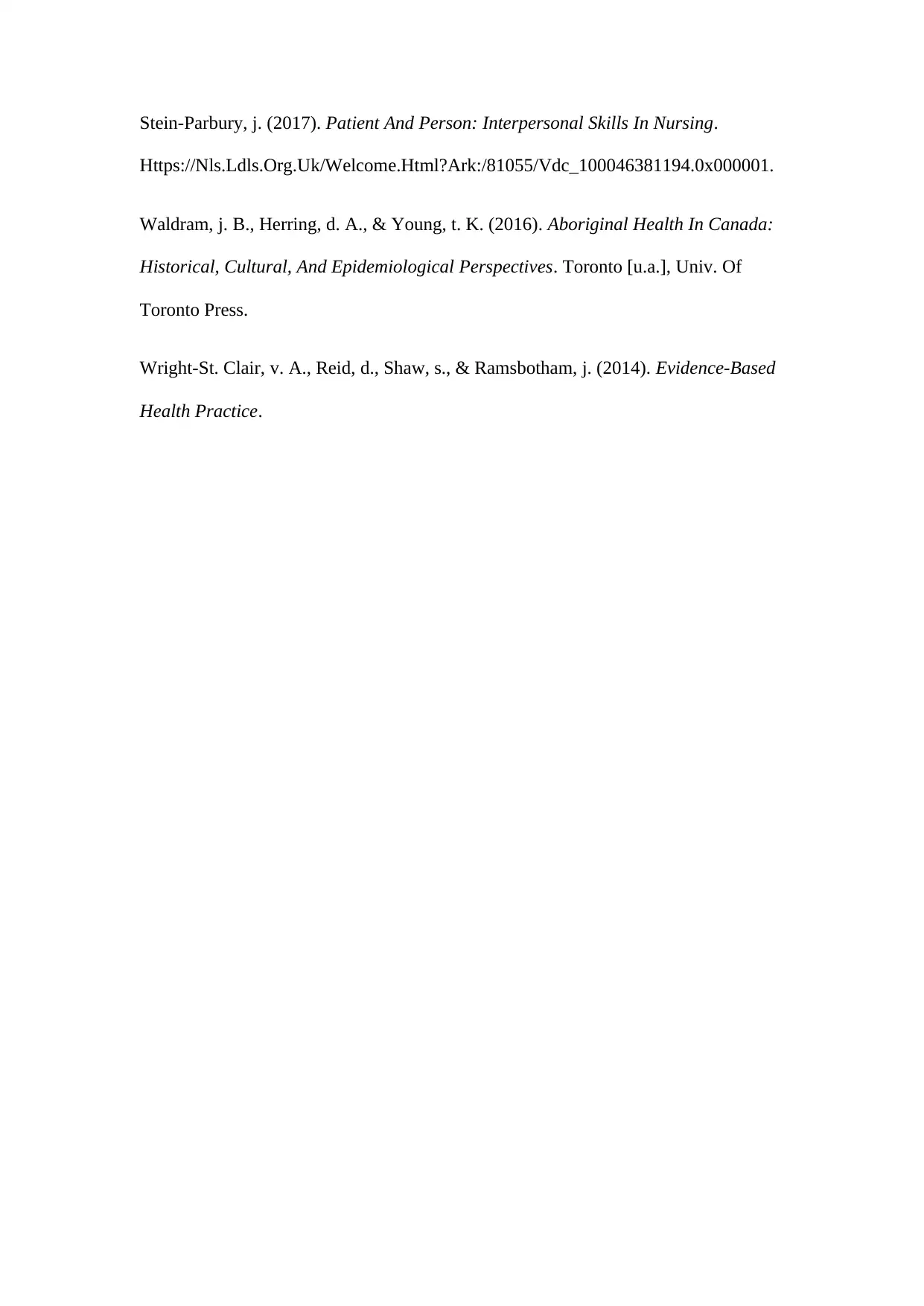
Stein-Parbury, j. (2017). Patient And Person: Interpersonal Skills In Nursing.
Https://Nls.Ldls.Org.Uk/Welcome.Html?Ark:/81055/Vdc_100046381194.0x000001.
Waldram, j. B., Herring, d. A., & Young, t. K. (2016). Aboriginal Health In Canada:
Historical, Cultural, And Epidemiological Perspectives. Toronto [u.a.], Univ. Of
Toronto Press.
Wright-St. Clair, v. A., Reid, d., Shaw, s., & Ramsbotham, j. (2014). Evidence-Based
Health Practice.
Https://Nls.Ldls.Org.Uk/Welcome.Html?Ark:/81055/Vdc_100046381194.0x000001.
Waldram, j. B., Herring, d. A., & Young, t. K. (2016). Aboriginal Health In Canada:
Historical, Cultural, And Epidemiological Perspectives. Toronto [u.a.], Univ. Of
Toronto Press.
Wright-St. Clair, v. A., Reid, d., Shaw, s., & Ramsbotham, j. (2014). Evidence-Based
Health Practice.
⊘ This is a preview!⊘
Do you want full access?
Subscribe today to unlock all pages.

Trusted by 1+ million students worldwide
1 out of 9
Related Documents
Your All-in-One AI-Powered Toolkit for Academic Success.
+13062052269
info@desklib.com
Available 24*7 on WhatsApp / Email
![[object Object]](/_next/static/media/star-bottom.7253800d.svg)
Unlock your academic potential
Copyright © 2020–2026 A2Z Services. All Rights Reserved. Developed and managed by ZUCOL.





